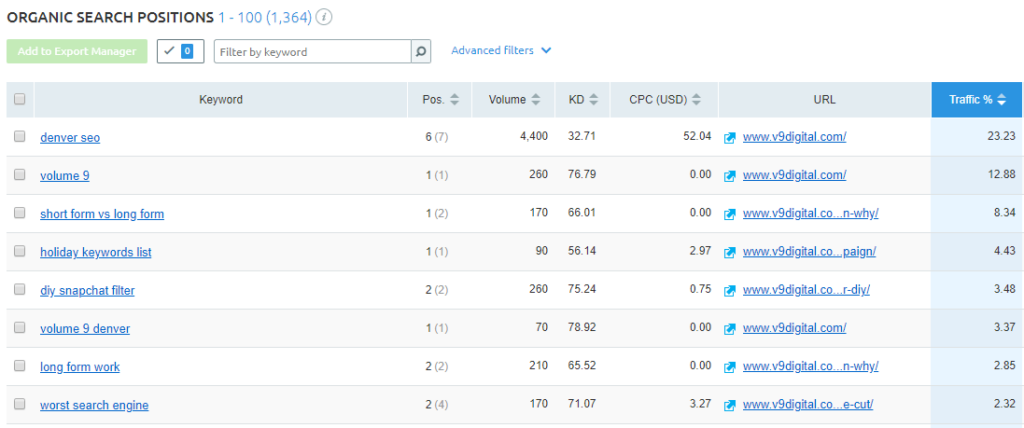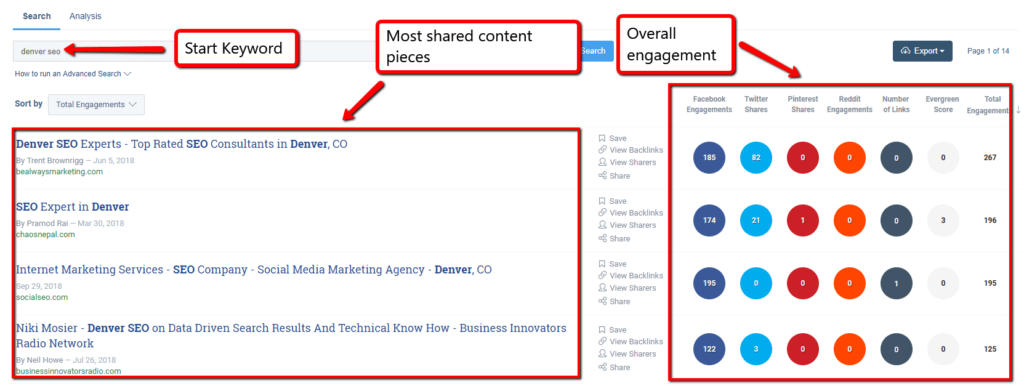Performing competitor keyword research is one of the best ways to boost your organic search optimization game. If you can figure out your competitor’s keywords, you can use that insight to guide your own SEO marketing strategy and potentially gain a competitive edge in the search results.
In this post, we will explore how to see your competitors’ keywords, know all that they are ranking for, the associated search volume and understand how to use that information effectively.
What is Competitor Keyword Research?
When we talk about a competitor’s keywords, we’re typically referring to both the keywords that your competitor ranks well for in search results, as well as the keywords your top competitors are targeting but has failed to rank well for. Both categories can inform your SEO keyword strategy.
Four Ways to Use Competitor Keyword Research:
- Steal your competitor’s keywords to compete for rankings in the same search results.
- Find and begin targeting keywords that have not yet been targeted by competitors.
- Discover long tail keywords used by your target market that you hadn’t thought of yourself.
- Find out why your competitor’s website ranks above your specific keywords for broad search terms.
How to Find Competitors’ Keywords
Before searching for a convenient tool that generates a list of competitor keywords with a few clicks….STOP. Competitor keyword research isn’t quite that simple. Although tools can be incredibly helpful, you’ll have to do a little manual digging to compile a comprehensive list of your competitor’s keywords.
Don’t let the effort required discourage you though. While there isn’t a single one-click tool to perform competitor analysis of organic keywords, there are a few different strategies available to smooth out and speed up your research process.
Top 5 Tools for Figuring Out Your Competitors’ Keywords:
1. The HTML Page Source of Your Competitor’s Website
In your Internet browser, go to your competitor’s website and choose a page to look for keywords in. Then, right-click on the page to open the “page source”. A window should pop up displaying the HTML source code of the page. Look in the code for the keywords in the title tag, the meta description, the optional keywords tag, and any image title tags or alt tags. (Not all websites use the keywords tag, but it’s worth checking.)
2. Screaming Frog Spider
Use the Screaming Frog Spider software to perform a simple SEO audit on your competitor’s site. Just download the software to your PC and use it to crawl your competitor’s website the way a search engine does. You’ll get lots of information on the website, including meta data, image alt text, anchor text, heading text, and much more. All of these components point to the keywords your competitor is targeting. Go crazy with competitor keyword research using Screaming Frog.
3. Google Keyword Planner Tool
All you need is a free Google account to access the Google Keyword Planner Tool in the Google AdWords interface.
-
Log into AdWords, navigate to the Keyword Planner, and locate the “Find new keywords” option.
-
Then, select “Search for new keywords using a phrase, website or category”.
-
Once you’ve opened the form, click on the text field under “Your landing page” and enter your competitor’s URL, and then click “Get ideas”.
-
Google will now take a moment to crawl that URL and generate a list of keywords related to both the page and the website as a whole.
-
When Google finishes and displays your results, click the “Keyword ideas” tab below the graph to see your list of competitor keywords.
4. SEMRush
SEMRush has a fabulous organic keyword tool which can show the ranking terms for just about any domain. It’s as simple as inputting your competitor’s website and looking at the list which SEMRush provides.
But on top of that, the SEMRush tracker also provides the URL which ranks for each term, which further allows you to understand what pieces of their content marketing are working especially well for your competition.
An example of all the useful keyword data which SEMRush provides, using the V9 site as an example. This same competitor research data can be gathered for any website or landing page.
5. BuzzSumo
BuzzSumo adds a very cool twist to the competitive keyword process, by looking at the thing from a social and sharing aspect. In so doing, it has a way of ‘reversing’ the competitive keyword research process. Here’s how it works:
Instead of thinking about your competitors’ keywords first, with BuzzSumo, you can start with known keywords that matter to you to see who also ranks for those terms. BuzzSumo will show you some of the most shared, liked, and socially distributed content for any given keyword.
For example, in this case, we can see all of the most socially shared content for the start keyword, “Denver SEO”.
The point is, by seeing what content is doing well, you can explore those pieces to better understand keyword variations, types, and nuances that are working. It may also help you identify “new” competitors. That is, other websites who compete for the ranking terms you care about.
More Tools for Competitor Keyword Research
Different online keyword tools will provide a list of your competitor’s PPC keywords (for AdWords, Bing Ads, etc.) with just a quick search. Our preferred search tools are SpyFu (free or premium) and SEMRush (free or premium), but a complete list of additional premium and free tools and options are below.
- FeedtheBot SEO Overview Tool (free)
- Ahrefs Keyword Explorer
- BuzzSumo (free or premium)
- Moz Open Site Explorer (free or premium)
- Moz Keyword Difficulty and SERP Analysis Tool (premium with free 30-day trial)
How to Take Advantage of Competitor Keyword Research
Ok, let’s say that you have looked at your competitor’s site, used a cool keyword research tool, explored what’s working socially, and now you have a great list of the keywords used by competitors. What’s next?
There are many different ways to use the competitive analysis and Google search intel that you’ve gathered. To start to put it to work, a few good next steps could include:
- Use the terms for competitive benchmarking purposes and to see how you stand up. This can be especially useful over time to see how you’re growing against the competition. Don’t forget to also check out backlink data for your organic competitors.
- Look for gaps in your own content and keyword portfolio. This can also help with your social media strategy.
- Let your competitors’ keywords inspire you to target new terms and develop appropriate content for those. This is probably the single best thing you can be doing for your website.
- Review the terms to gain insights into the types of things your audience really cares about online for your marketing campaigns.
- Find new competitors you may have not considered. It’s crucial to understand everyone ranking against you in the search engine results pages (SERPS).
What’s Next?
If this sounds like too much of a chore or you’re not sure what to do with your competitor site and organic traffic keywords, Volume Nine can help you make the most out of the competitive intelligence via content optimization or development. Contact us today with questions, or leave your thoughts below in the comment section. And if you have any other ways to perform SEO competitor keyword research, please share them!


